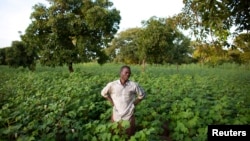DAKAR, SENEGAL —
The U.N. Food and Agriculture Organization says schools in Mali have been training cotton farmers about how to use natural substances in order to reduce the use of dangerous pesticides by 92 percent, while maintaining normal crop yields. The natural pesticides also may save money.
The United Nations Food and Agriculture Organization found that the introduction of new pest-control methods to cotton growers in Mali “nearly eliminated” the use of toxic pesticides.
The study, which was published Monday by the London-based Royal Society, followed two communities; one that was trained in the use of bio-pesticides, and one that was not.
Project manager William Settle is with the FAO Plant Production and Protection Division. “The outcome of the study, which looked at historical records from the cotton company itself over an eight-year period, showed that in the area in which the training took place ... those farmers reduced their use of synthetic, highly toxic pesticides by more than 92 percent. Whereas compared with another area of the country, not too far away, in which they had not yet conducted farmer training, pesticide use was unchanged.”
Cotton is one of the biggest drivers of economic growth in Mali. The FAO says an estimated 4 million farmers grow cotton crops each year and the crop accounts for up to 75 percent of the country’s exports earnings.
Settle said that unfortunately, the use of chemical pesticides is not uncommon when it comes to growing cotton.
“Cotton is the major cash crop for several West African countries, including Mali. And it tends to be an open door for pesticides, meaning that the pesticides come into the cotton system often times end up being distributed elsewhere, often times in vegetable systems,” he said.
Settle said that some alternatives to chemical pesticides include using extracts from the neem tree, which is commonly found throughout much of western Africa.
The FAO says during the course of the study, farmers collectively saved nearly a half-million dollars by not using chemical pesticides.
Settle said the challenge now is to convince farmers that natural pesticides are just as good, if not better than, chemical pesticides.
“Farmers have the assumption that pesticides are a kind of insurance, that using pesticides are, whether you need it or not, you are somehow ensuring the well-being of their crop. Through farmer field schools we are able to help the farmers demonstrate for themselves that alternatives are possible, and that these alternatives are less costly and less harmful for their health,” he said.
Settle said the FAO is working with U.S.-based researchers to help reduce the risk of pesticide usage in Africa and to develop a more cost-effective method of protecting crops.
The United Nations Food and Agriculture Organization found that the introduction of new pest-control methods to cotton growers in Mali “nearly eliminated” the use of toxic pesticides.
The study, which was published Monday by the London-based Royal Society, followed two communities; one that was trained in the use of bio-pesticides, and one that was not.
Project manager William Settle is with the FAO Plant Production and Protection Division. “The outcome of the study, which looked at historical records from the cotton company itself over an eight-year period, showed that in the area in which the training took place ... those farmers reduced their use of synthetic, highly toxic pesticides by more than 92 percent. Whereas compared with another area of the country, not too far away, in which they had not yet conducted farmer training, pesticide use was unchanged.”
Cotton is one of the biggest drivers of economic growth in Mali. The FAO says an estimated 4 million farmers grow cotton crops each year and the crop accounts for up to 75 percent of the country’s exports earnings.
Settle said that unfortunately, the use of chemical pesticides is not uncommon when it comes to growing cotton.
“Cotton is the major cash crop for several West African countries, including Mali. And it tends to be an open door for pesticides, meaning that the pesticides come into the cotton system often times end up being distributed elsewhere, often times in vegetable systems,” he said.
Settle said that some alternatives to chemical pesticides include using extracts from the neem tree, which is commonly found throughout much of western Africa.
The FAO says during the course of the study, farmers collectively saved nearly a half-million dollars by not using chemical pesticides.
Settle said the challenge now is to convince farmers that natural pesticides are just as good, if not better than, chemical pesticides.
“Farmers have the assumption that pesticides are a kind of insurance, that using pesticides are, whether you need it or not, you are somehow ensuring the well-being of their crop. Through farmer field schools we are able to help the farmers demonstrate for themselves that alternatives are possible, and that these alternatives are less costly and less harmful for their health,” he said.
Settle said the FAO is working with U.S.-based researchers to help reduce the risk of pesticide usage in Africa and to develop a more cost-effective method of protecting crops.




